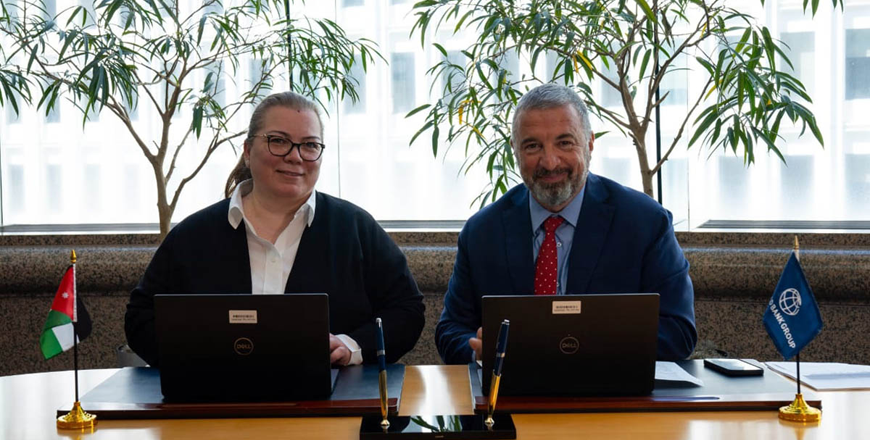AMMAN — Two new recently approved World Bank financed projects will help scale-up support to climate responsive public and private investments to promote job creation and business opportunities for women and help improve the efficiency of Jordan’s electricity sector with an emphasis on strengthening sector governance.
The two projects will support the implementation of Jordan’s 10-year Economic Modernisation Vision, which promotes sustainability as one of its main pillars and aims to position the Kingdom as a regional hub for green entrepreneurship and innovation and to attract investment, according to a statement posted on the World Bank website.
The loan agreements of the two projects — Jordan Inclusive, Transparent and Climate Responsive Investments Programme for Results and Electricity Sector Efficiency and Supply Reliability Programme for Results — were signed on Monday by Minister of Planning and International Cooperation Zeina Toukan and World Bank Country Director for the Middle East Department, Jean-Christophe Carret on the sidelines of the World Bank Spring Meetings in Washington, DC.
“Thanks to adaptive policies, Jordan has shown resilience to major regional and global crises,” said Carret.
“These two programmes will support the Government of Jordan’s economic reform agenda and help the Kingdom continue its home-grown structural reforms to achieve inclusive, sustainable and investment-led growth and job creation, particularly for youth and women.”
"We appreciate the continued partnership and support of the World Bank for Jordan’s reform and development priorities. These two new programmes will help the government’s efforts to implement the Economic Modernisation Vision Executive Programme 2023-2025 which is focused on advancing Jordan’s climate agenda, promoting green investment-led growth, and improving the efficiency and reliability of our electricity sector,” said Toukan.
Jordan Inclusive, Transparent and Climate Responsive Investments Programme for Results - $400 million
The World Bank Group’s Board of Executive Directors approved additional financing for the Jordan Inclusive, Transparent and Climate Responsive Investments Programme for Results to scale-up support to climate responsive public and private investment, promote jobs and business opportunities for women, and strengthen government effectiveness through participatory, data and evidence-based policy making.
The Additional Financing helps to operationalise progress Jordan has made in the first phase of the programme in integrating climate concerns as a key pillar of the country’s economic reform agenda and investment plans. Since 2021, the Government of Jordan has strengthened its climate agenda including by scaling up its commitments to the Nationally Determined Contribution (NDCs), by significantly increasing emission reduction targets, and by prioritising green public and private investments.
The additional financing will aim to further strengthen the quality of public investment and prioritize climate responsive public investment, including through public-private partnerships. It will enable a stronger set of interventions to scale up financing including through supporting steps toward the possible issuance of a sovereign green bond in the future and the implementation of a National Green Taxonomy.
Programme activities will support reforms and investments that create job opportunities. The programme will also aim to support government accountability and information sharing by incentivizing government responsiveness to citizen feedback through e-participation and supporting the production and analysis of critical statistical information to inform policy making, including on gender. In accordance with the recommendations of the Jordan Country Climate and Development Report, the PforR will also support Jordan’s goals to achieve low-carbon trajectory with current NDC target of 31 per cent of renewable energy in the electricity supply mix.
Electricity Sector Efficiency and Supply Reliability Programme for Results – $250 million
The Electricity Sector Efficiency and Supply Reliability Programme for Results (PforR) aims to improve the efficiency of Jordan’s electricity sector, maintain the country’s significant progress on reliability of electricity service, and strengthen sector governance.
Jordan has made significant progress in improving the reliability of its electricity supply, increasing the share of renewable energy in the electricity supply mix from 6 per cent in 2017 to 26 per cent in 2021, and introducing private investments in the sector through public-private partnerships.
Despite these achievements, the electricity sector faces several challenges that impede efficient growth in the long-term. These include the National Electric Power Company’s (NEPCO) difficult financial situation, the increase in electricity purchase costs, and the increase in debt service costs.
In order to tackle some of the challenges in the electricity sector, the Electricity Sector Efficiency and Supply Reliability Programme for Results PforR will support implementation of reforms that aim to improve electricity sector efficiency with a focus on cost saving and revenue enhancement measures; maintaining reliability of electricity service and adequate electricity supply from transmission grid-connected renewable energy (RE); and improving electricity sector governance.
The programme will benefit all electricity consumers in Jordan. The PforR programme will also support the implementation of good corporate governance practices at NEPCO, the timely collection of electricity bills, sound planning based on the principles of economic efficiency and competitive procurement of new generation investments and strengthening of evaluation of fiscal risks from public-private partnerships in the sector.
